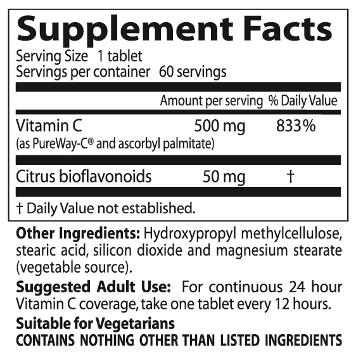
|
· Science-based nutrition · Dietary supplement · Superior uptake, bioavailability and cell retention compared to other forms of vitamin C*
PureWay-CŪ Sustained Release Vitamin C is a unique form of the essential nutrient vitamin C that contains vitamin C lipid metabolites. In fact, it is the most advanced form of vitamin C available. PureWay-CŪ has been studied in comparison to several other well-known forms of vitamin C.
Lab studies show that PureWay-CŪ has superior uptake, bioavailability and retention in cells, as well as more potent free radical scavenging capabilities than other forms of vitamin C, making it the preferred supplemental form on the market today. *This increased bioavailability means PureWay-CŪ has the potential to more potently support healthy neuron function and enhanced immune system activity as compared to other forms of vitamin C.* PureWay-CŪ is all-natural, GMO-free and allergen-free.
Delivers effective antioxidant and free radical scavenging activity to decrease markers of oxidative stress *
Supports the bodys immune system * Supports a Healthy Cardiovascular System *
Epidemiological and animal studies suggest that citrus bioflavonoids also support healthy cardiovascular function and circulation 12. An analysis of the flavonoid intake of 34,489 postmenopausal women in the sixteen-year Iowa Women's Health Study found significant positive correlations between flavonone and flavone intake and cardiovascular function 13. These two categories of flavonoids, flavonones and flavones, are the primary flavonoids found in citrus fruit. Hypothesized mechanisms by which flavonoids may offer benefits include antioxidant protection of lipid molecules, promotion of optimal endothelial function, and enhancement of circulation 14, 15.
Supports the bodys nervous system *
Scientific References Back to Top
1. Weeks BS, Perez PP. Med Sci Monit 2007;13:BR205-10. 2. Vinson JA, Bose P. Am J Clin Nutr 1988;48:601-4. 3. Pancorbo D, Vazquez C, Fletcher M. Vitamin C-lipid metabolites: Uptake and Retention and Effect on Plasma C-Reactive Protein and Oxidized LDL Levels in Healthy Volunteers. Comprehensive HealthCare of Miami, LLC. 2007. 4. Wannamethee SG, Lowe GD, Rumley A, others. Am J Clin Nutr 2006;83:567-74; quiz 726-7. 5. Sanchez-Moreno C, Jimenez-Escrig A, Saura-Calixto F. Nutr Res 2000;20:941-953. 6. Weeks BS, Perez PP. Med Sci Monit 2007;13:BR51-8. 7. Manthey JA, Grohmann K, Guthrie N. Curr Med Chem 2001;8:135-53. 8. Delaney B, Phillips K, Buswell D, others. Food Chem Toxicol 2001;39:1087-94. 9. Osganian SK, Stampfer MJ, Rimm E, others. J Am Coll Cardiol 2003;42:246-52. 10. Knekt P, Ritz J, Pereira MA, others. Am J Clin Nutr 2004;80:1508-20. 11. Hallfrisch J, Singh VN, Muller DC, others. Am J Clin Nutr 1994;60:100-5. 12. Knekt P, Kumpulainen J, Jarvinen R, others. Am J Clin Nutr 2002;76:560-8. 13. Mink PJ, Scrafford CG, Barraj LM, others. Am J Clin Nutr 2007;85:895-909. 14. O'Byrne DJ, Devaraj S, Grundy SM, Jialal I. Am J Clin Nutr 2002;76:1367-74. 15. Vita JA. Am J Clin Nutr 2005;81:292S-297S. Hwang SL, Yen GC. J Agric Food Chem 2008;56:859-64.
|
|
Med Sci Monit. 2008 Nov;14(11):CR547-51. Vitamin C-lipid metabolites: uptake and retention and effect on plasma C-reactive protein and oxidized LDL levels in healthy volunteers. Pancorbo D, Vazquez C, Fletcher MA. Source Comprehensive HealthCare of Miami, LLC, Miami, FL 33174, USA. Innteam@aol.com Abstract BACKGROUND: Previously, a novel formulation of vitamin C-lipid metabolites (PureWay-C) was shown to be more rapidly taken-up by human T-lymphocytes and more rapidly stimulate neurite outgrowth, fibroblast adhesion and inhibition of xenobiotic-induced T-cell hyperactivation. Here, PureWay-C serum levels were measured in healthy volunteers after oral supplementation. Plasma C-reactive protein and oxidized low density lipoprotein levels (LDL) were also measured. MATERIAL/METHODS: Healthy volunteers maintained a low vitamin C diet for 14 days and, following an overnight fast, received a single oral dose of (vitamin C) 1000 mg of either ascorbic acid (AA), calcium ascorbate (CaA), vitamin C-lipid metabolites (PureWay-C), or calcium ascorbate-calcium threonate-dehydroascorbate (Ester-C). Blood samples were collected immediately prior to the oral dose administration and at various times post ingestion. Twenty-four-hour urine collections were saved for oxalate and uric acid assays. RESULTS: PureWay-C supplementation leads to the highest absolute serum vitamin C levels when compared to AA, CaA and Ester-C. PureWay-C provides a statistically significant greater serum level than calcium ascorbate at 1, 2, 4, and 6 hours post oral supplementation whereas Ester-C shows a less but slightly statistically significant increase at only 1 and 4 hours. Oral supplementation with PureWay-C also led to a greater reduction in plasma C-reactive protein and oxidized LDL levels compared to the other vitamin C formulations. CONCLUSIONS: PureWay-C is more rapidly absorbed and leads to higher serum vitamin C levels and greater reduction of plasma levels of inflammatory and oxidative stress markers than other forms of vitamin C, including Ester-C. PMID:
18971870
[PubMed - indexed for MEDLINE] |

|
Apex CS buys PureWay-C from various vendors depending on price and availability. The manufacture is the same but with different private labels. |